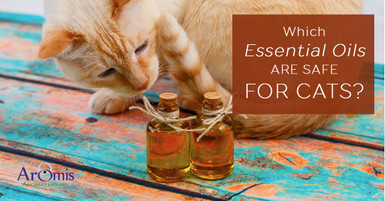Posted by Jonathan on Nov 24th 2020
Which Essential Oils are Safe for Cats?
If you’re considering using essential oils for your cat’s health, or you might want to think again. Although veterinarians do use essential oils on cats safely for specified purposes, some essential oils can be extremely toxic to cats, with resulting symptoms ranging from allergic reactions to organ failure.
If essential oils are safe for humans, how can they be so harmful for cats?
Certain essential oils (along with some household cleaners such as Pine-Sol) contain compounds called phenols. In humans, phenols are metabolized in the liver via specific enzymes which cats don’t have in their liver — which means that when they ingest these products, it can enter their bloodstream and poison their bodies.
It’s also worth noting that terpenes, another compound in some essential oils, may also be toxic to cats.
Essential Oils for Cats: Safety Notes
There are a few reasons why it can be difficult to tell exactly what types of oils are harmful to cats. Phenols and terpenes may be highly concentrated in some essential oils, and not in others, and this can even vary by brand. It can also be difficult to tell which type of essential oils are 100% pure.
Whether or not a given substance ends up being “toxic” can be more dependent on the dose or concentration than the variety of plant, which means that any oil could theoretically harm a cat.
A few safety precautions to bear in mind include
Which essential oils are safe for your cat?
It’s difficult to say exactly which oils are “safe” for cats, and we recommend consulting a veterinarian first in any case. However, the ASPCA notes that the following plants are non-toxic to cats:
- Sage
- Fennel
- Jasmine
- Basil
- Rose
Some sources claim that cedarwood is safe for cats because it typically does not contain phenol, however, this isn’t guaranteed. Lemongrass is another example of essential oil that some say is safe, however, only if used in very low concentrations and non-directly.
What essential oils are harmful to cats?
Since toxicity potential can depend on the quality and dose of a given oil, it’s important to practice caution with every oil. A good rule of thumb is to take extra care with oils that could easily burn or sting even with pure application to your own skin, such as oregano, cinnamon, mints, clove, eucalyptus and tea tree.
According to the Canadian Veterinary Medical Association (CMVA), the following essential oils could be toxic to cats, depending on the overall amount and type of exposure.
- Bergamot
- Citrus oils
- Peppermint
- Sandalwood
- Rose
- Spruce
- Wintergreen
- Eucalyptus
- Pine
- Tea tree
- Oregano
- Lavender
- Birch
- Clove
- Cinnamon
- Thyme
- Oregano
The list above is by no means comprehensive, and there may be other oils which could be harmful to your cat. Consult the CMVA or ASPCA websites for complete lists.
What to Do if You Believe Your Cat Has Been in Contact with Essential Oil
If your cat ingested, inhaled or come into contact with essential oil, an allergic or toxic reaction could result.
A mild allergic skin reaction may present itself as skin redness or itching. If you find essential oil on your cat’s fur but they are not presenting symptoms, be sure to wash it off immediately with gentle soap and contact a veterinarian.
Essential oils can affect organs including the liver, heart, and kidneys, so any symptoms that indicate those kinds of problems should be taken seriously.
Symptoms of essential oil poisoning include
- Lethargy
- Trouble walking
- Weakness
- Dizziness
- Vomiting
- Drooling
- Muscle spasms
- Red patches on the skin
- Trouble breathing
- Slow heart rate
- Seizures
If your cat displays any of the symptoms above, head to the vet immediately and take the suspected product(s) with you as you so that they can determine the cause of the poising.

